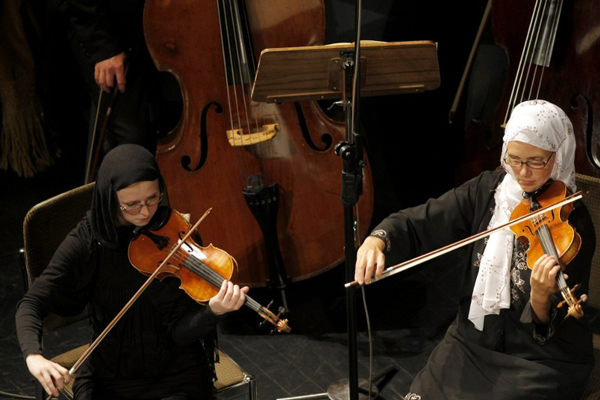Women in Iran's orchestra were just pulled off stage. Because they're female

Iran's struggle to portray a more moderate image took another blow on Sunday as it state-mandated misogyny reared its head.
Moments before Iran's largest and oldest symphony orchestra was to perform at a national sporting event, the performance was cancelled. The reason? The orchestra had women members.
The Tehran Symphony Orchestra was 15 minutes away from performing the Iranian national anthem at the event when the organisers told the orchestra conductor Ali Rahbari that the women musicians were not to perform. According to Rahbari, the organisers stated that it was "absolutely impossible for women to play musical instruments on stage."
The outraged conductor termed it an "insult", and pointed out that the orchestra were to perform the ultimate in national tributes, the national anthem. When the situation could not be resolved, the orchestra refused to take the stage without their female colleagues.
Iran, a gender progressive Islamic republic
Despite Sunday's incident, Iran is in fact one of the more gender progressive countries in the middle-east.
Iranian women enjoy more rights than their counterparts in the far-less-vilified Saudi Arabia. Even as Saudi Arabian women just won the right to vote and stand for municipal elections, there are currently 9 women in Iran's parliament.
Women in Iran were given the right to vote as early as 1963. They've been Cabinet members and occupied positions of considerable power. They can also drive and travel on their own and make up the majority of Iran's university population.
But despite this progress, women musicians in Iran have long been singled out for persecution. Beginning with the Iranian Revolution in 1979, when women's rights in general took a body blow, Iran's women musicians have faced hostility and repression.
No women, please
In fact, musicians in general suffered as the newly formed Islamic Republic took a hardline stance against music. Religious authorities first argued that music was harmful to society, leading to a complete ban on music.
While traditional and classical forms of music were soon allowed, women were left at the fringes: they aren't allowed to perform solo, as authorities decreed that the sound of a solo female voice is considered too provocative for men. A solo female vocalist can only perform in front of an all-female audience. To skirt this rule, female vocalists have often opted to co-sing songs alongside a male vocalist to stay within the laws.
This is especially crippling because every live music performance in Iran requires a government permit. Ironically, this is actually an improvement on the total ban on live performances in the decade following the Iranian Revolution.

Photo: Behrouz Mehri/AFP
The oppression of women musicians doesn't end there. Women are also banned from playing various instruments, drums included.
All this notwithstanding, the incident on Sunday is still exceptional given that the performers were technically compliant with State laws and had a license from the government. But incidents of this nature have been becoming more frequent.
A pushback against moderation
When Hassan Rouhani ascended to power, after a decade of Mahmoud Ahmedinjad's rule, expectations among the country's liberals were high. Rouhani, a progressive by the dystopically-authoritarian standards of Iran, was expected to liberalise the country.
While still remaining hardline on matters like Israel, he hasn't shirked his centrist and reformist mantle, especially when it comes to women.
Despite opposition from conservative religious authorities, he has made positive noises about the place of women in Iranian society. In a nationally-televised speech, he stated that he would not tolerate "a culture of sexual discrimination". This despite Ayatollah Khamenei's statements that gender equality was "a mistake of Western thought".
Clearly he's willing to take a stand against extreme ideologies like the Ayatollah's. The problem, though, is that a hardline section of Iran's religious-political leadership has been pushing back against Rouhani's policies, demanding stricter measures against women musicians.
At a government-sponsored festival held in Isfahan in October, women musicians were asked not to take the stage. Instead, they had to watch the show as members of the audience. While they were promised they would be allowed to perform later, that didn't happen either.
And while he has the mandate, Rouhani is just discovering that he doesn't yet have the might to change decades of misogyny on his own.
Iran, at this moment, is facing an internal battle to determine its own identity. However, acts like Sunday's that prove that the reality on the ground is a long way from the moderation Rouhani in theory stands for.







![BJP's Kapil Mishra recreates Shankar Mahadevan’s ‘Breathless’ song to highlight Delhi pollution [WATCH] BJP's Kapil Mishra recreates Shankar Mahadevan’s ‘Breathless’ song to highlight Delhi pollution [WATCH]](https://images.catchnews.com/upload/2022/11/03/kapil-mishra_240884_300x172.png)

![Anupam Kher shares pictures of his toned body on 67th birthday [MUST SEE] Anupam Kher shares pictures of his toned body on 67th birthday [MUST SEE]](https://images.catchnews.com/upload/2022/03/07/Anupam_kher_231145_300x172.jpg)



_in_Assams_Dibrugarh_(Photo_257977_1600x1200.jpg)


